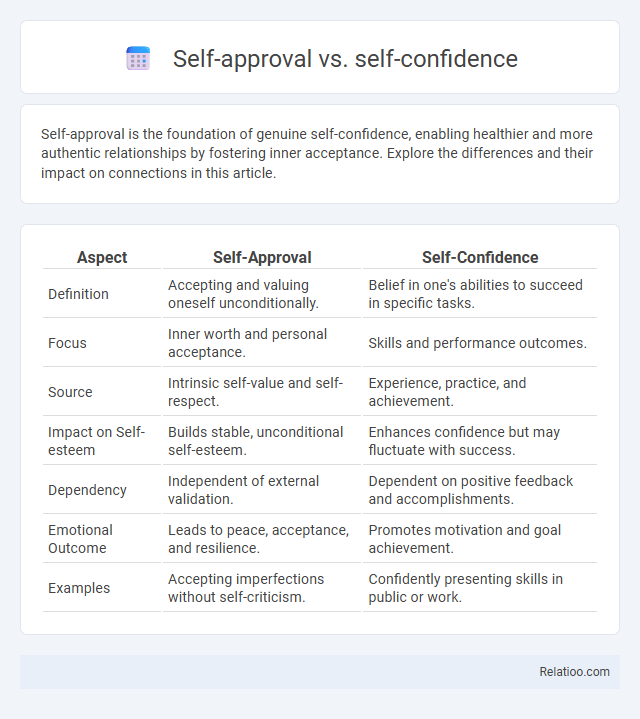Self-approval is the foundation of genuine self-confidence, enabling healthier and more authentic relationships by fostering inner acceptance. Explore the differences and their impact on connections in this article.
Table of Comparison
| Aspect | Self-Approval | Self-Confidence |
|---|---|---|
| Definition | Accepting and valuing oneself unconditionally. | Belief in one's abilities to succeed in specific tasks. |
| Focus | Inner worth and personal acceptance. | Skills and performance outcomes. |
| Source | Intrinsic self-value and self-respect. | Experience, practice, and achievement. |
| Impact on Self-esteem | Builds stable, unconditional self-esteem. | Enhances confidence but may fluctuate with success. |
| Dependency | Independent of external validation. | Dependent on positive feedback and accomplishments. |
| Emotional Outcome | Leads to peace, acceptance, and resilience. | Promotes motivation and goal achievement. |
| Examples | Accepting imperfections without self-criticism. | Confidently presenting skills in public or work. |
Understanding Self-Approval and Self-Confidence
Self-approval refers to accepting and valuing oneself regardless of external feedback, which promotes inner peace and resilience. Self-confidence is the belief in one's abilities to achieve goals and handle challenges effectively, often driven by past successes and skills. Developing self-approval strengthens emotional well-being, while cultivating self-confidence enhances motivation and performance in various life domains.
Key Differences Between Self-Approval and Self-Confidence
Self-approval involves accepting and valuing oneself despite flaws, focusing on internal self-acceptance, while self-confidence is the belief in one's abilities and competence to achieve goals. Self-approval provides emotional resilience and inner peace independent of external validation, whereas self-confidence often fluctuates with success or failure in specific tasks. Understanding these differences clarifies that self-approval fosters unconditional self-worth, while self-confidence supports proactive engagement and performance in various life areas.
Psychological Foundations of Self-Approval
Self-approval arises from intrinsic psychological processes such as self-acceptance, emotional regulation, and internal validation, distinguishing it from self-confidence, which depends on perceived competence and external achievements. It is rooted in fostering unconditional self-worth independent of performance outcomes, deeply influencing overall mental health and resilience. Emphasizing self-approval enhances emotional stability by reducing reliance on external approval, promoting authentic self-perception and psychological well-being.
How Self-Confidence Shapes Behavior and Success
Self-confidence profoundly shapes your behavior by fostering a positive mindset that encourages risk-taking and resilience in the face of challenges. Unlike self-approval, which centers on internal acceptance, self-confidence directly influences your ability to assert yourself and pursue goals with determination. This powerful belief in your capabilities drives success by enabling you to navigate obstacles effectively and maintain motivation.
Benefits of Cultivating Self-Approval
Cultivating self-approval strengthens your emotional resilience and fosters a positive self-image, enabling you to embrace your imperfections without harsh judgment. Unlike self-confidence, which relies on external achievements, self-approval roots your sense of worth in unconditional self-acceptance, promoting mental well-being and reducing anxiety. This internal validation empowers you to pursue personal growth authentically, enhancing overall life satisfaction and interpersonal relationships.
The Role of Self-Confidence in Personal Growth
Self-confidence plays a crucial role in personal growth by enabling you to trust your abilities and take on new challenges with resilience. Unlike self-approval, which centers on accepting oneself, and self-esteem, rooted in evaluating one's worth, self-confidence drives action and perseverance. Cultivating strong self-confidence leads to improved decision-making, greater motivation, and the courage to pursue goals despite obstacles.
Overcoming Barriers to Self-Approval
Overcoming barriers to self-approval requires recognizing and challenging internal negative beliefs that undermine your self-worth. Unlike self-confidence, which is based on abilities and external validation, self-approval is about accepting yourself unconditionally despite flaws or setbacks. Cultivating self-approval helps you build resilience, reduce self-criticism, and achieve a healthier, more authentic sense of self.
Building Genuine Self-Confidence
Building genuine self-confidence involves cultivating a realistic and positive perception of your abilities, distinct from the need for external validation inherent in self-approval. Unlike self-approval, which depends on others' acceptance, or self-esteem based on self-worth evaluations, true self-confidence emerges from consistent achievements and overcoming challenges that reinforce inner belief. Developing this authentic confidence requires intentional practice, self-reflection, and embracing growth opportunities that validate one's competence and resilience.
Balancing Self-Approval with Healthy Ambition
Balancing self-approval with healthy ambition requires recognizing personal worth without relying solely on external achievements or validation. Self-approval fosters inner peace and resilience by embracing one's strengths and imperfections, while healthy ambition drives growth and goal-setting through constructive motivation. Cultivating both ensures a stable self-esteem that supports continuous improvement without succumbing to self-doubt or complacency.
Practical Strategies for Enhancing Both Traits
Enhancing self-approval and self-confidence involves practical strategies such as practicing self-compassion, setting achievable goals, and celebrating personal achievements to build a positive self-image. Mindfulness techniques and cognitive restructuring help individuals recognize and challenge negative self-talk, fostering a more supportive internal dialogue. Consistent reinforcement through journaling progress and seeking constructive feedback promotes sustained growth in both self-approval and self-confidence.

Infographic: Self-approval vs Self-confidence
 relatioo.com
relatioo.com